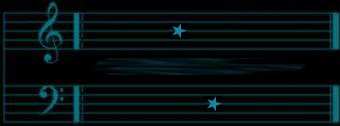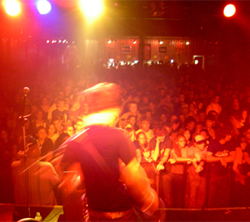 |
 |
 |
 |
| ::Interviews:: |
| review & interview content, as well as web site graphics & design, copywrite 2003-2004 Euphonia Online. use of materials granted only with reasonable purposes. |
 |
| interviewed by robby sumner |
 |
| Interview with Forrest October 11th, 2005 |
Forrest Olsen - Vocals, Guitar JT Viele - Guitar Matt Broadbent - Bass Claudio Rivera - Drums |
| E: You guys recorded your debut full-length, Pandora, for Punknews Records, in late 2004. Do you consider this your "first" release, or would that apply to earlier demos you unofficially released to fans?
Forrest: The band was different back when we released the demos and such... I would consider this our first "release" release, because we haven't been on a record label besides with this record--everything else, we pressed ourselves. So this is definitely the first one. E: When writing for the record, were you at all worried about making sure that every track on the record represented the sound the listener was to know you by? Or was experimentation still present in spite of it being your debut? Forrest: We don't know what we're going to write from song to song--the songs kind of write themselves. We usually write all the music together, and then I'll take that and put melodies and lyrics over it. So we don't like to create a box of "What is the Somerset sound?" We let it come to us, and some songs sound completely different from our other ones, and that's exciting for me and it's exciting for the rest of us, too--that's how we like it. E: For a song to serve its purpose, do you find it important that the lyrical content shows the theme very concretely? Or can the meaning behind a song be left somewhat vague and still have the same desired effect? Forrest: Well, there's so many different kinds of poetry you can do... I do a lot of literal stuff, and a lot of figurative stuff, too. I think it's important that there's room for a listener to be able to finish the picture themselves, if you will... like, for them to complete the art and have at least enough space that it can be interpreted with whatever's going on in their life. I think that's really important. E: Did you put a lot of thought and work into choosing a producer, or did you leave that sort of thing to the label? How essential is the producer to the success of an album? Forrest: The producer that we had for this album actually helped us do our demos, too. We made a deal together that if he was going to help us do our demos and we could shop them to labels, then we we'd go with him on the record. He's been a good friend of ours for a long time... the label's never suggested a different producer, and we were very happy with him. Oh, Chris Fudurich was our producer. E: When touring, do you guys like to perform songs that are still in demo form, with the finishing touches yet to be completed? Forrest: Well, all the songs except for two on the record we'd been playing live, before they were recorded, because it's such a struggle in this day to find a label to put out your music, because there's just so many bands and the music industry isn't doing very well. So we were playing most of our material before we went in to record it. But some of the songs, including the last song on the CD, didn't totally come together until we were in the studio. We kind of orchestrated the whole song there. Usually, I say that if a song is done now and we're going to record it in a future, we might keep it a secret until we release the next record. Or only play one song, if it's a new one. E: Having been your label's first and, for a time, only concern, do you think you benefited from the attention? What were the downsides of being the first band for a brand new label? Forrest: It's great that they were putting all their attention into us... it's kind of scary being the guinea pig of something new, but it's also kind of exciting because we're working with our friends--Scott from Punknews Records. We've had Thanksgiving and Easter dinner over at his house, and we've been friends long before he even started this label thing. He approached us he was like, Epitaph wants to do it, too, and we were fed up with waiting on other labels and dealing with the whole music industry, and it was just great to be able to work with our friends. It's a little scary, it being a new label, but it's also very exciting. E: How well would you say your band's been doing in terms of getting tours booked? Forrest: We book all our own tours right now, because we don't have a booking agent--it's very, very difficult for a band to get a booking agent right now. So we just try to find other bands who are at the same level as we are, and we trade shows in different cities. We have this two month tour that we're just tying up now. We do as much of it as we can... it's very important to us to be out on the road, trying to get people to hear us for the first time. I would love to tour with a bigger band, and as soon as that comes up we will, but until then we'll be playing basement shows and coffee shops. E: How do you think playing with bands that are your peers compares to opening for a much larger band? Forrest: It's kind of like trading listeners with the bands [that are our peers]... if we were on tour with a bigger band, there's probably going to be a whole lot more people who have never heard us before, listening to us. At the same time, there's kind of like a brotherhood that you get when all of us are fighting for air, and it's really fun to help each other out and try to trade fanbases and stuff like that. E: Great! Well that should about do it for questions... do you have anything extra you want to say? Forrest: Well, it's kind of a fun little tidbit... for the last little while I've had a lot of problems with tonsilitus, and I've been having a bleeding throat when I sing every night. And even though my tonsils have been infected and there's a wound that bleeds when I sing--when there was a tour, I called my doctor and he said that I should absolutely not be singing and to come home right away, but we decided that it was too important to us that we follow through with our commitments, and so we're doing the rest of the tour and hopefully my throat will last the next three dates here. E: Wow, that's... amazing. Forrest: It's scary, but I see it as a challenge, and I really think it's important that I follow through with my artistic commitments. E: Well thanks a lot, man. |